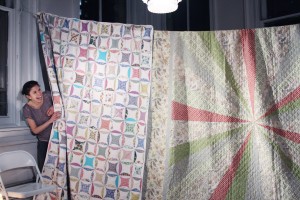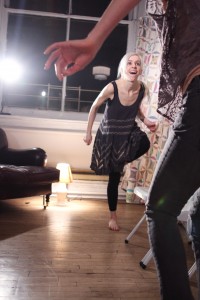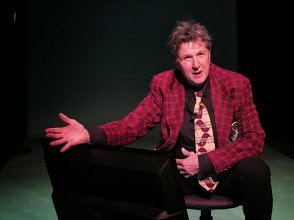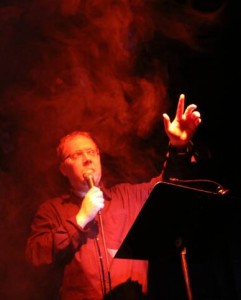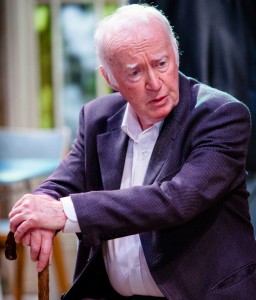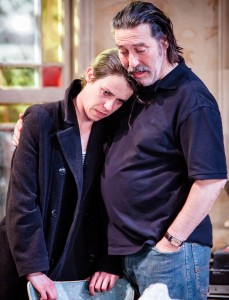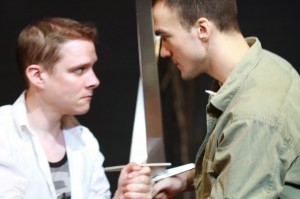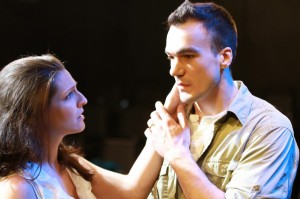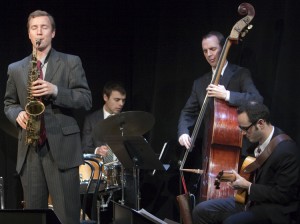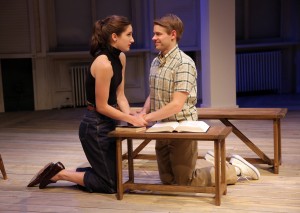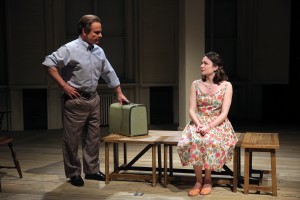If you were born or grew up in the mid- to late-1980s, chances are the names Blanche, Rose, Dorothy and Sophia will strike in you a very nostalgic cord. When the four Miami-based retirees known as The Golden Girls debuted in 1985, they immediately became a hit with their post-menopausal, cheesecake-slicing antics. From the ditzy, air-headed Scandinavian Rose to the wonderfully saucy and sex-driven Blanche, it wasn't hard to laugh along with these Girls. The show ran for only seven seasons (practically a lifetime by today's standards), but it made an indelible mark on American pop culture; Thank You For Being a Friend, which is currently running at the Laurie Beechman Theatre is definitely evident of the sitcom's impact. The musical parody features an all-male cast as the Golden Girls themselves with music and lyrics by director Nick Brennan.
Here, the names are slightly different: Blanche is now Blanchet; Rose is Roz; and Dorothy and Sophia are Dorothea and Sophie. Despite the slight changes, the rest of the show is still in keeping with the original television comedy — from the dialogue to the overall episodic tone. Indeed, at the show's start, we find Blanchette (with binoculars in hand and her booty out to the audience, of course) snooping on the new neighbors next door. The other ladies soon make their entrances into the kitchen, and we learn that their new neighbor is actually none other than Latino pop star Ricky Martin (played by Adrian Rifat).
As dinner theater entertainment goes, Thank You For Being a Friend makes for a super fun night out. Each of the cast members have their share of the stage. Chad Ryan as Blanchet is spot-on, and both Luke Jones and John de los Santos are hilarious as the mother-daughter duo. However, it is Brennan as the naive but sweet Roz and Adrian Rifat as the pop star has-been that completely steal the show. Brennan doing Betty White's "aw shucks" mannerisms and Rifat's entrance with Ricky's signature "prayer hands" were hilarious.
As a group, they complement one another very well and seem to have an intricate knowledge of the others' rhythms, which only further helped the comedy along. Also bringing on the funny were the songs, among which were revampings of old showtunes, as well as originals written by Brennan. Some examples include "All That Jizz," an obviously classy homage sung by Ricky; "Roz's Turn," in which Roz proclaims her right to Shady Oaks fame; "Sex Changing," in which Dorothea goes through some, er...changes; and the oh-so-catchy finale, "Miami."
Of course, one cannot write about a musical set in the '80s without talking about the clothes. The costumes by Jessa-Raye Court are absolutely fab in all their shoulder-padded glory. At one point, the girls do away with the talent show doldrums with some good old-fashioned retail therapy ("Fab Fads") with...what else? A fashion show with cardboard outfits and sequins. As for the set design, much of which revolved — literally — around a couple of multi-purpose panels, behind which was where all the mind-boggling quick changes took place (seriously, the cast of Broadway's Cinderella would even be impressed). The stagehands even donned as golden-aged girls themselves with wigs and tacky pantsuits.
If you're in for some great food, drink and some raucous laughter, then you'll love Thank You For Being a Friend. It will not only make you pine for the good old days of over-sized blazers and the "Latin Invasion" of '99 (a moment of silence please), but it will make you remember that aside from the fashion blunders and questionable musical taste, not all of it was bad. So head down to the Laurie Beechman Theatre and walk down memory lane — it'll make your life less of a, well...drag!
Thank You For Being a Friend is playing at the Laurie Beechman Theatre (which is located inside West Bank Cafe at 407 West 42nd St.). Evening performances are Wednesdays at 7 p.m., and Fridays, Feb. 28, March 14 and 28 at 10 p.m. with added shows Saturday, March 8 at 7 p.m. and Thursday, March 27 at 7 p.m. Tickets are $20 (plus a $15 food/drink minimum) and available at 212-352-3101 or Spincyclenyc.com.























